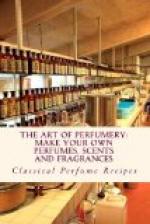It does not follow that the formulae that are here given produce at all times the odor that is most approved; it is evident that in pastils, as with other perfumes, a great deal depends upon taste. Many persons very much object to the aroma of benzoin, while they greatly admire the fumes of cascarilla.
THE PERFUME LAMP.
Shortly after the discovery of the peculiar property of spongy platinum remaining incandescent in the vapor of alcohol, the late Mr. I. Deck, of Cambridge, made a very ingenious application of it for the purpose of perfuming apartments. An ordinary spirit lamp is filled with Eau de Cologne, and “trimmed” with a wick in the usual manner. Over the centre of the wick, and standing about the eighth of an inch above it, a small ball of spongy platinum is placed, maintained in its position by being fixed to a thin glass rod, which is inserted into the wick.
[Illustration: Perfume Lamp.]
Thus arranged, the lamp is to be lighted and allowed to burn until the platinum becomes red hot; the flame may then be blown out, nevertheless the platinum remains incandescent for an indefinite period. The proximity of a red-hot ball to a material of the physical quality of Eau de Cologne, diffused over a surface of cotton wick, as a matter of course causes its rapid evaporation, and as a consequence the diffusion of odor.
Instead of the lamp being charged with Eau de Cologne, we may use Eau de Portugal, vervaine, or any other spirituous essence. Several perfumers make a particular mixture for this purpose, which is called
EAU A BRULER.
Eau de Cologne, 1 pint.
Tincture of benzoin, 2 oz.
" vanilla,
1 oz.
Otto of thyme, }
" mint, } of each,
1/2 drachm.
" nutmeg, }
Another form, called
EAU POUR BRULER.
Rectified spirit, 1 pint.
Benzoic acid, 1/2 oz.
Otto of thyme, } of each, 1 drachm.
" caraway, }
" bergamot,
2 oz.
Persons who are in the habit of using the perfume lamps will, however frequently observe that, whatever difference there may be in the composition of the fluid introduced into the lamp, there is a degree of similarity in the odor of the result when the platinum is in action. This arises from the fact, that so long as there is the vapor of alcohol, mixed with oxygen-air, passing over red-hot platinum, certain definite products always result, namely, acetic acid, aldehyde, and acetal, which are formed more or less and impart a peculiar and rather agreeable fragrance to the vapor, but which overpowers any other odor that is present.
FUMIGATING PAPER.
There are two modes of preparing this article:—




